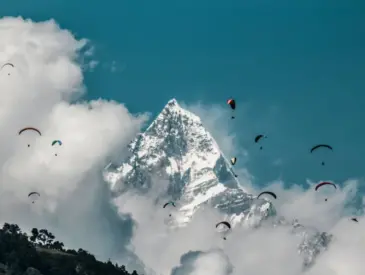Nepal is a country renowned for its majestic landscapes, cultural richness, and adventurous trekking routes. As a traveler, it’s crucial to prioritize sustainability and reduce your environmental footprint. Practicing eco-friendly travel in Nepal not only helps protect the natural beauty and biodiversity of this incredible destination but also supports local communities. Whether you’re exploring the bustling streets of Kathmandu or trekking through the Himalayan mountains, these eco-friendly travel tips for Nepal will guide you on how to be a responsible traveler.
1. Choose Eco-Friendly Accommodations
One of the best ways to practice eco-friendly travel in Nepal is by staying in sustainable accommodations. Many lodges and hotels, particularly in trekking areas, are now adopting greener practices. Look for eco-friendly hotels that use solar power, recycle waste, and prioritize water conservation. Staying in homestays with local families is another great way to reduce your environmental impact while contributing directly to the local economy.
2. Pack Light and Smart
Traveling with less luggage not only makes your journey easier but also minimizes fuel consumption for transportation, contributing to eco-friendly travel in Nepal. Pack reusable items such as a water bottle, cloth bags, and a refillable toiletry kit to avoid single-use plastics. This small effort helps reduce the amount of plastic waste generated during your trip. Also, consider bringing biodegradable toiletries and eco-friendly sunscreen to protect Nepal’s pristine environment.

3. Respect Local Wildlife and Nature
When trekking through Nepal’s diverse ecosystems, it’s essential to practice responsible and eco-friendly behavior. Stick to designated trails to avoid disturbing natural habitats, and avoid littering. If you come across waste, it’s a good habit to carry it with you until you can properly dispose of it. Respect wildlife by maintaining a safe distance and never feeding animals. Following these eco-friendly travel tips in Nepal ensures the protection of fragile ecosystems and wildlife.
4. Support Local Businesses and Eco-Tours
Supporting local businesses is key to eco-friendly travel in Nepal. Opt for locally-owned shops, restaurants, and tour operators that prioritize sustainability. Purchasing handmade crafts, clothes, or goods from small businesses helps bolster the local economy. Additionally, choose eco-tours or guided treks that are committed to minimizing their environmental impact and emphasize responsible tourism.
5. Travel by Public Transport or Walk
Nepal offers plenty of opportunities for eco-friendly transportation. In cities like Kathmandu and Pokhara, walking or using bicycles is not only a great way to reduce your carbon footprint but also a perfect way to explore. Public transportation such as buses and electric rickshaws are available and are a more sustainable alternative to private taxis. For longer journeys, opt for buses or carpooling rather than flights when possible. This makes a significant contribution to eco-friendly travel in Nepal.
6. Be Mindful of Water and Energy Usage
Nepal’s resources are limited, particularly in rural and mountain areas. Make a conscious effort to conserve water by taking shorter showers and avoiding unnecessary water use. Similarly, be mindful of electricity consumption, especially in areas where power supply is scarce. Many accommodations use solar power, so avoid excessive use of electronics and switch off lights when not in use. Being considerate of resources is an important part of practicing eco-friendly travel in Nepal.
7. Participate in Community and Conservation Projects
Many eco-friendly travel tips initiatives in Nepal allow travelers to give back to the environment and the community. Whether it’s participating in conservation efforts, joining a local cleanup initiative, or volunteering with organizations dedicated to environmental protection, your involvement can make a positive impact. Volunteering to help reforest areas or teaching local students about sustainability are wonderful ways to contribute to Nepal’s future while enjoying a deeper travel experience.
8. Choose Responsible Treks and Tours
Trekking is one of Nepal’s biggest draws, but it can also have a significant impact on the environment. When booking a trek, look for responsible trekking companies that follow sustainable practices. These companies often adhere to guidelines such as packing out all trash, using local porters, and ensuring that trekkers don’t disturb the environment. Trekking responsibly is one of the most important aspects of eco-friendly travel in Nepal.
9. Reduce Waste: Say No to Plastics
Reducing your plastic usage is one of the easiest ways to engage in eco-friendly travel tips for Nepal. Carry a reusable water bottle with a built-in filter to avoid buying bottled water. In many regions, especially while trekking, plastic waste can be a huge problem as disposal methods are limited. Saying no to plastic bags, straws, and other single-use items will help prevent waste from polluting Nepal’s natural beauty.
10. Educate and Spread Awareness
Lastly, one of the most impactful eco-friendly travel tips for Nepal is to educate others. Share your knowledge about sustainable travel practices with fellow travelers and locals alike. Raising awareness about the importance of eco-friendly practices ensures that Nepal remains a stunning, sustainable destination for generations to come.
Conclusion
Nepal is a breathtaking country filled with natural wonders and vibrant culture. As a traveler, you can help preserve its beauty by adopting eco-friendly travel practices. From choosing sustainable accommodations and transportation to supporting local communities, these eco-friendly travel tips for Nepal will guide you on a path of responsible and conscious tourism. By embracing these tips, you’ll enjoy a fulfilling travel experience while contributing to the conservation of Nepal’s incredible landscapes and heritage.





